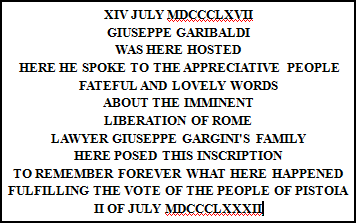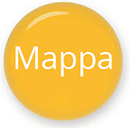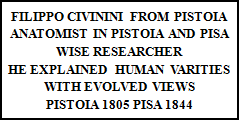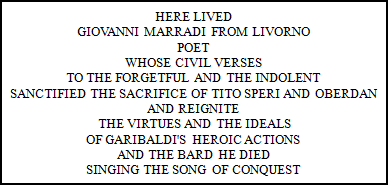 |
GIUSEPPE GARIBALDI (Nizza, 1807 - Caprera, 1882).
The memorial tablet celebrates Giuseppe Garibaldi's visit to Pistoia on the 14th of July 1867. On that occasion the hero was hosted in the lawyer Giuseppe Gargini's house. Gargini and his wife Marietta welcomed Garibaldi warmly with a celebratory lunch. As the inscription says, the hero spoke to the crowd from the window of Gargini's house. The morning after, Garibaldi left by train with a group of his followers towards Gavinana, where he wanted to pay homage to the grave of Francesco Ferrucci. Apparently during his trip back his beloved poncho, a reminder of his South American adventures, was stolen. The legend says that he had been so strongly attached to it because he had used it to wrap his newborn baby and his dying wife. Garibaldi's visit to Pistoia was an event that people had been waiting for, for a very long time. It had been supposed to happen in 1862, on the occasion of the opening ceremony of the shooting range, but Garibaldi had had to delay because of the events in Aspromonte. This left a deep bitterness in all those who had aspired to meet him. Amongst them the poetess Louisa Grace who was the wife of the engineer Francesco Bartolini. For the occasion she had specially composed 'un Inno a Garibaldi' (A hymn to Garibaldi) which would then have been set to music to celebrate the arrival of Garibaldi in Pistoia. However, Louisa Grace died prematurely in 1865, and unfortunately never had the chance to meet him. The tablet was posed on the 2nd of July 1882, on the occasion of the solemn celebrations for the thirtieth day after the death of Giuseppe Garibaldi. At that time, the small square in front of Teatro Manzoni (Manzoni Theatre) was named after Giuseppe Civinini, son of the Doctor Filippo Civinini and personal secretary of Garibaldi.
The memorial tablet celebrates Giuseppe Garibaldi's visit to Pistoia on the 14th of July 1867. On that occasion the hero was hosted in the lawyer Giuseppe Gargini's house. Gargini and his wife Marietta welcomed Garibaldi warmly with a celebratory lunch. As the inscription says, the hero spoke to the crowd from the window of Gargini's house. The morning after, Garibaldi left by train with a group of his followers towards Gavinana, where he wanted to pay homage to the grave of Francesco Ferrucci. Apparently during his trip back his beloved poncho, a reminder of his South American adventures, was stolen. The legend says that he had been so strongly attached to it because he had used it to wrap his newborn baby and his dying wife. Garibaldi's visit to Pistoia was an event that people had been waiting for, for a very long time. It had been supposed to happen in 1862, on the occasion of the opening ceremony of the shooting range, but Garibaldi had had to delay because of the events in Aspromonte. This left a deep bitterness in all those who had aspired to meet him. Amongst them the poetess Louisa Grace who was the wife of the engineer Francesco Bartolini. For the occasion she had specially composed 'un Inno a Garibaldi' (A hymn to Garibaldi) which would then have been set to music to celebrate the arrival of Garibaldi in Pistoia. However, Louisa Grace died prematurely in 1865, and unfortunately never had the chance to meet him. The tablet was posed on the 2nd of July 1882, on the occasion of the solemn celebrations for the thirtieth day after the death of Giuseppe Garibaldi. At that time, the small square in front of Teatro Manzoni (Manzoni Theatre) was named after Giuseppe Civinini, son of the Doctor Filippo Civinini and personal secretary of Garibaldi.




